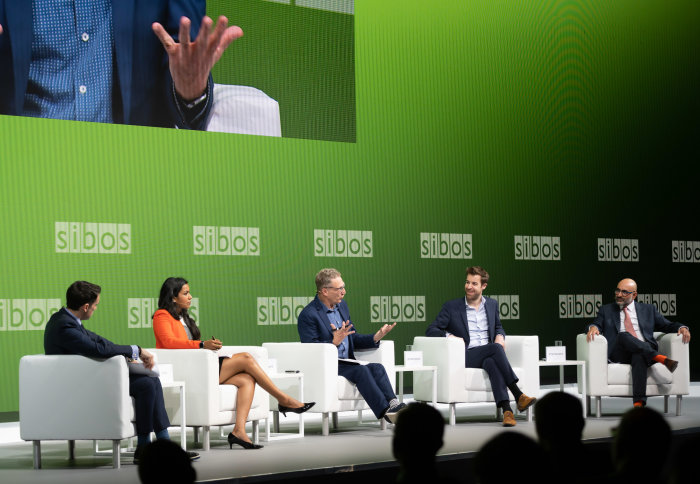Pioneering Imperial tech on show at top finance industry conference
by Lauren Pow

Dr Yves-Alexandre de Montjoye (second from right) with industry experts at SIBOS
Imperial's holographic teaching technology featured at Sibos 2019 - the world’s premier financial services conference.
Imperial College Business School’s Dr Mark Kennedy and the Data Science Institute’s Dr Yves-Alexandre de Montjoye shared their insights on the conference theme, “Thriving in a hyper-connected world”, at the global conference that saw more than 8,000 delegates gather at the ExCel London.
Dr Kennedy moderated a panel of banking and financial service industry leaders to explore what data science is and how AI would shape the banks of the future.
“For businesses to thrive in this era of digital transformation, leaders need to not only understand how technologies such as AI, machine learning and big data work, but also know how to implement them to drive competitive advantage." David Brown Director of Executive Education, Business School
“Already, AI and data science-based applications are becoming must haves for banks, and innovative new ones are cropping up every day.” Dr Kennedy said.
“From early efforts in robotic process automation and chatbots to the sophisticated fraud detection algorithms now deployed, challenger and legacy banks alike need to be alert of new uses and compliance implications.”
As AI algorithms and applications continue to evolve, they bring the need for a universal, collaborative approach to privacy, argued Dr de Montjoye, who is also a faculty member in Imperial’s Department of Computing and leads Imperial’s Computational Privacy Group.
“Allowing AI to learn from people's data while strictly preserving their privacy is one of the greatest challenges organisations will face in the coming five years,” he said. “The development of AI can't – and doesn't have to – come at the expense of people's privacy."
Imperial College Business School Dean Professor Francisco Veloso attended Sibos and said the School’s involvement in the conference demonstrated its leading credentials at the intersection of finance and digital disruption.
“This opportunity has allowed the Business School to demonstrate its expertise in fields such as digital transformation, AI and machine learning. These are fields that we lead in and implement across our corporate partnerships and programmes,” he said.
Imperial College Business School Director of Executive Education David Brown said many of the key topics from the conference were incorporated across Open and Custom Programmes.
“For businesses to thrive in this era of digital transformation, leaders need to not only understand how technologies such as AI, machine learning and big data work, but also know how to implement them to drive competitive advantage,” he said.
“Our Executive Education programmes translate the latest thinking from leading Imperial academics and industry leaders to enable business leaders to ask the right questions, make the right plans and see through to implementation.”
Holograms - the future of business communication?
Imperial’s pioneering hologram teaching technology was once again on show in the panel discussion, for a debate on data science and the future of banking, moderated by Dr Kennedy.
He was joined by IBM Regtech Vice President Michael Curry, Feedzai Chief Executive Nuno Sebastião and Royal Bank of Canada Senior Vice President of Technology Corporate Systems Chris Philips – who appeared via hologram while based in his Toronto office.
Through the hologram, Mr Philips appeared as a 3D embodiment on a screen and was able to see, hear and answer questions raised by the audience in London.
The hologram is the latest addition to the catalogue of education technologies employed by the Business School’s Edtech Lab.
The Edtech Lab’s custom online learning platform, ‘The Hub’, underpins the student experience on programmes including the award-winning Global Online MBA, online Master’s in Business Analytics, and Executive Education short courses and custom programmes.
Article text (excluding photos or graphics) © Imperial College London.
Photos and graphics subject to third party copyright used with permission or © Imperial College London.
Reporter
Lauren Pow
Business School